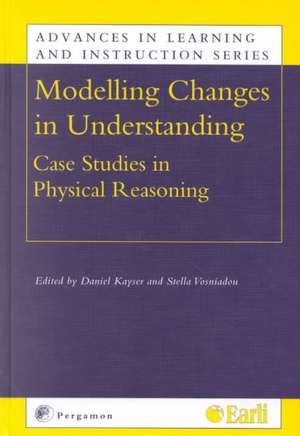Modelling Changes in Understanding: Case Studies in Physical Reasoning: Advances in Learning and Instruction Series
Autor Daniel Kayser Editat de D. Kayser, Stella Vosniadouen Limba Engleză Hardback – 31 dec 1998
Focussing on the discipline of Physics, this volume discusses the following topics: the difference in the organisation of knowledge between experts and novices; the construction of accurate models of the learner at different stages in the knowledge acquisition process; computer models which claim to answer questions and accumulate understanding in a similar way to human beings.
Preț: 999.86 lei
Preț vechi: 1298.52 lei
-23% Nou
Puncte Express: 1500
Preț estimativ în valută:
191.33€ • 200.26$ • 159.24£
191.33€ • 200.26$ • 159.24£
Carte tipărită la comandă
Livrare economică 31 martie-14 aprilie
Preluare comenzi: 021 569.72.76
Specificații
ISBN-13: 9780080434544
ISBN-10: 0080434541
Pagini: 302
Dimensiuni: 173 x 244 x 20 mm
Greutate: 0.74 kg
Editura: Emerald Group Publishing Limited
Seria Advances in Learning and Instruction Series
ISBN-10: 0080434541
Pagini: 302
Dimensiuni: 173 x 244 x 20 mm
Greutate: 0.74 kg
Editura: Emerald Group Publishing Limited
Seria Advances in Learning and Instruction Series
Cuprins
Acknowledgment. Contributors. Preface. General Overview (D. Kayser et al.). Introductory Remarks: three phases in the development of a new paradigm (K. VanLehn). Changes in categorization as a function of expertise and context in elementary mechanics (M.T. Bajo et al.). Conceptualising mental representations of mechanics: a method to investigate representational change (G.C. van der Veer et al.). Modelling elementary school students' solution of mechanics problems (S. Vosniadou et al.). Conceptual change as a logical theory revision process: a machine learning perspective (F. Esposito et al.). Conceptual change in the explanations of phenomena in astronomy (K. Morik, M. Mühlenbrock). Modelling conceptual change: representational issues (F. Neri et al.). Teaching the energy concept with the machine learning system APT (C. Nédellec, A. Tiberghien). Using dialogue analysis to capture teachers/student interactions that promote changes in understanding (G. Sabah et al.).
Recenzii
Eileen Scanlon
The main target audience is researchers in science education and cognitive scientists for whom physics learning has been a great source of interest. The relevance of the book to those interested in instructional design is that in the words of the editors, it contributes to an "understanding of the distance between students' conceptions and the knowledge to be taught". It is undoubtedly true that the data presented in the early chapters of the book are of interest. Where the general reader may have more difficulty is in appreciating the contribution of the machine learning approach to understanding human learning, In this Kurt Van Lehn's introductory remarks are helpful, pointing out the different experimental and modelling approaches used in different chapters of the book. However, a remark made in the editors' general overview states that the authors of the book have diverse opinions regarding this relationship between machine and human learning. If this topic interests you, there is a range of approaches on offer here.
Computers & Education, Vol 31
The main target audience is researchers in science education and cognitive scientists for whom physics learning has been a great source of interest. The relevance of the book to those interested in instructional design is that in the words of the editors, it contributes to an "understanding of the distance between students' conceptions and the knowledge to be taught". It is undoubtedly true that the data presented in the early chapters of the book are of interest. Where the general reader may have more difficulty is in appreciating the contribution of the machine learning approach to understanding human learning, In this Kurt Van Lehn's introductory remarks are helpful, pointing out the different experimental and modelling approaches used in different chapters of the book. However, a remark made in the editors' general overview states that the authors of the book have diverse opinions regarding this relationship between machine and human learning. If this topic interests you, there is a range of approaches on offer here.
Computers & Education, Vol 31












